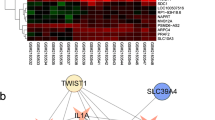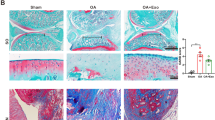Abstract
Objective
Our previous study revealed that synovial mesenchymal stem cell (SMSC)-derived exosomal microRNA-302c enhanced chondrogenesis by targeting a disintegrin and metalloproteinase 19 (ADAM19) in vitro. This study aimed to validate the potential of SMSC-derived exosomal microRNA-302c for the treatment of osteoarthritis in vivo.
Methods
After 4 weeks of destabilization of the medial meniscus surgery (DMM) to establish an osteoarthritis model, the rats received weekly articular cavity injection of SMSCs with or without GW4869 treatment (exosome inhibitor) or exosomes from SMSCs with or without microRNA-320c overexpression for another 4 weeks.
Results
SMSCs and SMSC-derived exosomes reduced the Osteoarthritis Research Society International (OARSI) score, improved cartilage damage repair, suppressed cartilage inflammation, suppressed extracellular matrix (ECM) degradation, and inhibited chondrocyte apoptosis in DMM rats. However, these effects were largely hampered in rats that were injected with GW4869-treated SMSCs. Moreover, exosomes from microRNA-320c-overexpressing SMSCs exerted a better effect than exosomes from negative control SMSCs on decreasing the OARSI score, enhancing cartilage damage repair, suppressing cartilage inflammation, and inhibiting ECM degradation and chondrocyte apoptosis. Mechanistically, exosomes from microRNA-320c-overexpressing SMSCs reduced the levels of ADAM19, as well as β-catenin and MYC, which are two critical proteins in Wnt signalling.
Conclusion
SMSC-derived exosomal microRNA-320c suppresses ECM degradation and chondrocyte apoptosis to facilitate cartilage damage repair in osteoarthritis rats by targeting ADAM19-dependent Wnt signalling.







Similar content being viewed by others
Data availability
The datasets generated and/or analysed during the current study are available from the corresponding author on reasonable request.
References
Abu Owida H (2022) Recent biomimetic approaches for articular cartilage tissue engineering and their clinical applications: narrative review of the literature. Adv Orthop 2022:8670174
Arden NK, Perry TA, Bannuru RR, Bruyere O, Cooper C, Haugen IK, Hochberg MC, McAlindon TE, Mobasheri A, Reginster JY (2021) Non-surgical management of knee osteoarthritis: comparison of ESCEO and OARSI 2019 guidelines. Nat Rev Rheumatol 17:59–66
Bai R, Miao MZ, Li H, Wang Y, Hou R, He K, Wu X, Jin H, Zeng C, Cui Y, Lei G (2022) Increased Wnt/beta-catenin signaling contributes to autophagy inhibition resulting from a dietary magnesium deficiency in injury-induced osteoarthritis. Arthritis Res Ther 24:165
Bortoluzzi A, Furini F, Scire CA (2018) Osteoarthritis and its management—epidemiology, nutritional aspects and environmental factors. Autoimmun Rev 17:1097–1104
Chen Z, Wang H, Xia Y, Yan F, Lu Y (2018) Therapeutic potential of mesenchymal cell-derived miRNA-150-5p-expressing exosomes in rheumatoid arthritis mediated by the modulation of MMP14 and VEGF. J Immunol 201:2472–2482
Chen XY, Wan SF, Yao NN, Lin ZJ, Mao YG, Yu XH, Wang YZ (2021) Inhibition of the immunoproteasome LMP2 ameliorates ischemia/hypoxia-induced blood-brain barrier injury through the Wnt/beta-catenin signalling pathway. Mil Med Res 8:62
De Palma A, Nalesso G (2021) WNT signalling in osteoarthritis and its pharmacological targeting. Handb Exp Pharmacol 269:337–356
Dennison EM (2022) Osteoarthritis: the importance of hormonal status in midlife women. Maturitas 165:8–11
Fujii Y, Liu L, Yagasaki L, Inotsume M, Chiba T, Asahara H (2022) Cartilage homeostasis and osteoarthritis. Int J Mol Sci 23:6316
Hu S, Mao G, Zhang Z, Wu P, Wen X, Liao W, Zhang Z (2019) MicroRNA-320c inhibits development of osteoarthritis through downregulation of canonical Wnt signaling pathway. Life Sci 228:242–250
Katz JN, Arant KR, Loeser RF (2021) Diagnosis and treatment of hip and knee osteoarthritis: a review. JAMA 325:568–578
Kong R, Gao J, Zhang J, Ji L, Yu Y, Zhang L, Zhao D (2022) Synovial mesenchymal stem cell-derived exosomal miR-320c enhances chondrogenesis by targeting ADAM19. Fut Med Chem 14:81–96
Latourte A, Kloppenburg M, Richette P (2020) Emerging pharmaceutical therapies for osteoarthritis. Nat Rev Rheumatol 16:673–688
Li TE, Wang S, Shen XT, Zhang Z, Chen M, Wang H, Zhu Y, Xu D, Hu BY, Wei R, Zheng Y, Dong QZ, Qin LX (2020) PKM2 drives hepatocellular carcinoma progression by inducing immunosuppressive microenvironment. Front Immunol 11:589997
Nedunchezhiyan U, Varughese I, Sun AR, Wu X, Crawford R, Prasadam I (2022) Obesity, inflammation, and immune system in osteoarthritis. Front Immunol 13:907750
Peng Z, Sun H, Bunpetch V, Koh Y, Wen Y, Wu D, Ouyang H (2021) The regulation of cartilage extracellular matrix homeostasis in joint cartilage degeneration and regeneration. Biomaterials 268:120555
Pritzker KP, Gay S, Jimenez SA, Ostergaard K, Pelletier JP, Revell PA, Salter D, van den Berg WB (2006) Osteoarthritis cartilage histopathology: grading and staging. Osteoarthr Cartil 14:13–29
Qiu M, Liu D, Fu Q (2021) MiR-129-5p shuttled by human synovial mesenchymal stem cell-derived exosomes relieves IL-1beta induced osteoarthritis via targeting HMGB1. Life Sci 269:118987
Quicke JG, Conaghan PG, Corp N, Peat G (2022) Osteoarthritis year in review 2021: epidemiology & therapy. Osteoarthr Cartil 30:196–206
Rahmati M, Nalesso G, Mobasheri A, Mozafari M (2017) Aging and osteoarthritis: central role of the extracellular matrix. Ageing Res Rev 40:20–30
Sanchez-Lopez E, Coras R, Torres A, Lane NE, Guma M (2022) Synovial inflammation in osteoarthritis progression. Nat Rev Rheumatol 18:258–275
Sharma L (2021) Osteoarthritis of the Knee. N Engl J Med 384:51–59
Tao SC, Yuan T, Zhang YL, Yin WJ, Guo SC, Zhang CQ (2017) Exosomes derived from miR-140-5p-overexpressing human synovial mesenchymal stem cells enhance cartilage tissue regeneration and prevent osteoarthritis of the knee in a rat model. Theranostics 7:180–195
Tat SK, Pelletier JP, Mineau F, Caron J, Martel-Pelletier J (2011) Strontium ranelate inhibits key factors affecting bone remodeling in human osteoarthritic subchondral bone osteoblasts. Bone 49:559–567
Varela-Eirin M, Loureiro J, Fonseca E, Corrochano S, Caeiro JR, Collado M, Mayan MD (2018) Cartilage regeneration and ageing: targeting cellular plasticity in osteoarthritis. Ageing Res Rev 42:56–71
Walczak BE, Jiao H, Lee MS, Li WJ (2021) Reprogrammed synovial fluid-derived mesenchymal stem/stromal cells acquire enhanced therapeutic potential for articular cartilage repair. Cartilage 13:530S-543S
Xu X, Liang Y, Li X, Ouyang K, Wang M, Cao T, Li W, Liu J, Xiong J, Li B, Xia J, Wang D, Duan L (2021) Exosome-mediated delivery of kartogenin for chondrogenesis of synovial fluid-derived mesenchymal stem cells and cartilage regeneration. Biomaterials 269:120539
Zhang J, Zhang Y, Ma Y, Luo L, Chu M, Zhang Z (2021) Therapeutic potential of exosomal circRNA derived from synovial mesenchymal cells via targeting circEDIL3/miR-485-3p/PIAS3/STAT3/VEGF functional module in rheumatoid arthritis. Int J Nanomed 16:7977–7994
Zheng T, Li Y, Zhang X, Xu J, Luo M (2022) Exosomes derived from miR-212-5p overexpressed human synovial mesenchymal stem cells suppress chondrocyte degeneration and inflammation by targeting ELF3. Front Bioeng Biotechnol 10:816209
Funding
This study was supported by the National Natural Science Foundation of China (No. 81901583).
Author information
Authors and Affiliations
Corresponding authors
Ethics declarations
Conflict of interest
The authors have no relevant financial or nonfinancial interests to disclose.
Ethical approval
This study was approved by the Animal Care and Use Committee (reference number: CHEC2020-105, approval date: 2020.9.27). All animal experiments were performed in accordance with the animal guidelines of the National Institutes of Health.
Additional information
Publisher's Note
Springer Nature remains neutral with regard to jurisdictional claims in published maps and institutional affiliations.
Supplementary Information
Below is the link to the electronic supplementary material.
10787_2023_1142_MOESM1_ESM.tif
Supplementary Figure 1. Effect of different doses of SMSC-derived exosomes on cartilage damage repair. SOFA and HE staining of joint samples in the groups (A). Comparison of OARSI scores among the groups (B) (TIF 17314 KB)
Rights and permissions
Springer Nature or its licensor (e.g. a society or other partner) holds exclusive rights to this article under a publishing agreement with the author(s) or other rightsholder(s); author self-archiving of the accepted manuscript version of this article is solely governed by the terms of such publishing agreement and applicable law.
About this article
Cite this article
Kong, R., Zhang, J., Ji, L. et al. Synovial mesenchymal stem cell-derived exosomal microRNA-320c facilitates cartilage damage repair by targeting ADAM19-dependent Wnt signalling in osteoarthritis rats. Inflammopharmacol 31, 915–926 (2023). https://doi.org/10.1007/s10787-023-01142-y
Received:
Accepted:
Published:
Issue Date:
DOI: https://doi.org/10.1007/s10787-023-01142-y




